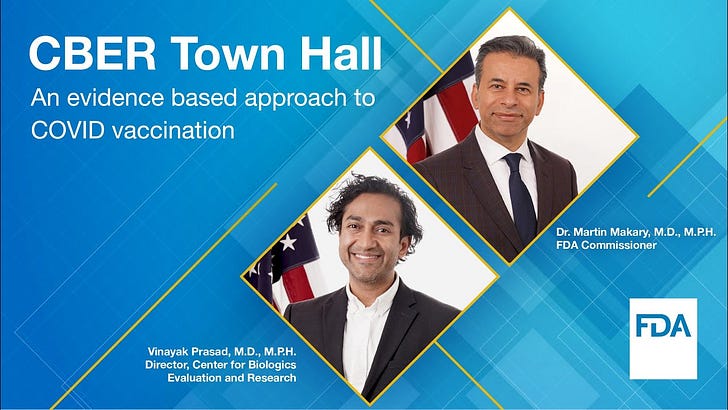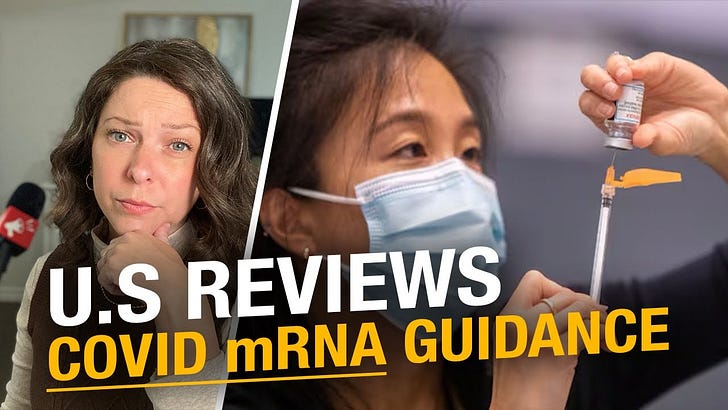Shots Divided: Comparing Canadian and U.S. Approaches to mRNA Boosters
Why the U.S. Demands Clinical Trials While Canada Still Recommends Shots for Babies?
In a year where post-pandemic recovery is underway globally, the divergence in vaccine policy between Canada and the United States has never been more stark.
In U.S.
On May 21, 2025, Dr. Vignyak Prasad, director at the U.S. FDA’s Center for Biologics Evaluation and Research, laid out a new approach to COVID-19 boosters.
Watch the videos below for what you won’t hear from CBC or Canada’s mainstream media. The transcripts from these videos are here (for easier quoting).
Informed by evolving data, the U.S. will now (See Appendix for more details):
Limit modified RNA (mRNA) COVID-19 shots to individuals 65+ or those at high risk.
Require randomized controlled trials for use in low-risk populations.
Prioritize measurable endpoints: severe illness, hospitalization, and death.
"We must develop randomized evidence. We owe it to the American people." — Dr. Vignyak Prasad, FDA (May 21, 2025)
This marks a significant turn from blanket recommendations to targeted, evidence-based immunization—especially as uptake plummeted among U.S. healthcare workers.
In Canada:
Meanwhile in Canada, no such change has occurred. The National Advisory Committee on Immunization (NACI) continues recommending mRNA boosters (see Health Canada vaccine guidance https://www.canada.ca/en/public-health/services/immunization.html):
For everyone, including infants as young as 6 months.
With no new clinical trial requirements.
Relying on outdated assumptions about infection prevention, despite international scientific pushback.
"Can we at least have an honest conversation? Can we ask why Canada’s still recommending these shots for babies?" — Tamara Ugolini, Rebel News
Source: Rebel News Report
Health Canada maintains that COVID-19 vaccination “may reduce your risk of becoming infected,” even though such a claim was never established as a clinical endpoint in trials. Rebel News journalist Tamara Ugolini pressed Health Canada for clarity. No updated scientific rationale was provided.
Again, this is not something that you will hear from CBC or other Canadian MSM. So, to learn more about this, you need to listen to alternative news sources. The following article documents some of latest news stories from such sources - with full transcript (for easier quoting!).
International Context
Denmark, Finland, and Sweden had already scaled back mRNA booster recommendations for youth and low-risk groups as early as 2022, citing heart-related concerns such as myocarditis.
Source: Sweden Public Health Agency, Finland THL, Denmark SSI
The U.S. has now joined them. Canada has not.
The Disconnect
Why is Canada still recommending universal boosters while major democracies are pivoting to risk-based, evidence-driven approaches?
Financial entanglements? Canada has billions locked into vaccine contracts.
Institutional inertia? Admitting error is harder than forging ahead.
Censorship legacy? Dissenters were vilified. Policy reversal may imply they were right.
"Doctors are hungry for data on COVID-19 boosters. If a 52-year-old perfectly healthy patient asked me whether to get their sixth booster, I wouldn’t have any evidence to offer." — Dr. Marty Makary, former FDA commissioner
Source: JAMA Editorial, May 2025
Ugolini frames the issue bluntly:
"Canadians deserve better than recycled talking points. Our health, our kids’ health, and our future matters—and it depends on it."
Conclusion
Where the U.S. now insists on gold standard science, Canada remains committed to a path of precautionary repetition, grounded in political and institutional continuity rather than adaptive evidence. The question for Canadian public health: Is this science, or is this dogma?
Meanwhile also in Canada
Three more legal victories have emerged for employees who were denied COVID-19 vaccine exemptions on religious grounds. These rulings reveal how pandemic-era rights violations are now being reframed—not as flaws in the mandates themselves, but as isolated “implementation errors.” This echoes how the Soviet Union explained away its own atrocities.
Drawing from my personal experience growing up in the USSR, I explore these disturbing parallels in the article that I wrote for my other (dg4vp) substack:
Appendix C: U.S. FDA’s May 2025 Vaccine Briefing — Key Takeaways
In a significant step toward transparency and science-driven policy, the U.S. Food and Drug Administration (FDA) presented its updated COVID-19 booster strategy directly to the public in a live-streamed briefing featuring Dr. Vinay Prasad and Commissioner Dr. Marty Makary.
Their message: evidence must drive policy—especially when it comes to repeat COVID-19 vaccinations in healthy individuals.
1. Risk-Based Approval Strategy
“We will consider approval for people 65 and older and those at high risk using immunologic endpoints.”
— Dr. Vinay Prasad
Fast-track approvals remain for high-risk groups (e.g., obesity, depression, immunocompromised).
Roughly 100–200 million Americans fall into this broad category.
2. Clinical Trials Required for Ages 50–64
“We must develop randomized evidence. We owe it to the American people.”
— Dr. Vinay Prasad
FDA will now require randomized controlled trials (RCTs) before approving new boosters for individuals aged 50 to 64.
Trials must include those previously infected and aim to demonstrate a ≥30% reduction in symptomatic COVID-19.
Follow-up must last at least 6 months to assess lasting benefit.
3. No Mandates for Healthy Youth or Close Contacts
“There is no high-quality evidence that vaccinating people around the immunocompromised benefits them more than the vulnerable getting vaccinated themselves.”
— Dr. Prasad
FDA will no longer assume indirect protection for healthy people vaccinating “for others” without trial data.
Instead, direct risk-based strategies (as in RSV vaccine approvals) are prioritized.
4. Public Trust and Scientific Transparency
“We’re close to a crisis of public trust in vaccines. Part of rebuilding that trust is having conversations like this.”
— Dr. Makary“Doctors want data. If the evidence supports benefit, most will recommend it.”
— Dr. Prasad
85% of U.S. healthcare workers declined the most recent COVID booster.
FDA recognizes growing skepticism and is shifting toward gold standard science + common sense.
5. Shifting from Annual Assumptions
“The virus doesn’t follow a calendar… We’ll adapt based on antigenic shift, not annual scheduling.”
— Dr. Prasad
FDA rejects the notion of an automatic yearly COVID booster.
Regulatory changes will now follow the science—not pre-set timelines.
6. Canada vs. U.S.: The Broader Contrast
“The U.S. is now back in line with the rest of the world. The prior universal annual booster push—that was the contrarian policy.”
— Dr. Prasad
This statement directly underscores the contrast with Canada, where, as detailed in the main article, boosters are still recommended for everyone—including infants as young as 6 months.
Conclusion
With this briefing, the U.S. FDA pivots toward real-world relevance, trial-based accountability, and a restoration of public trust—explicitly moving away from assumptions that defined prior pandemic-era vaccine policy.
Link to full briefing: FDA Direct: COVID-19 Vaccine Policy Update (May 2025)
Disclaimer: This article’s opinions are that of the author, not of any institution. It is not for legal or medical advice.
Support This Work Across All Channels
If you believe in open dialogue, informed choice, and exploring underreported perspectives, help keep the conversation going—like and share this article on your preferred platform.
I write these articles on my own time as a contribution to my community—especially for those seeking truth and guidance in these increasingly censored times. Your support—through follows, likes, and shares—makes a real difference.
You can follow me here:
🔹 LinkedIn
🔹 Facebook
🔹 Twitter/X
🔹 YouTube (@Dr.Dmitry.Gorodnichy), YouTube (@IVIM)
My articles are, and will always remain, free to read.





